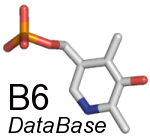|
|
| type |
Journal Article |
| authors |
Maimann, S.; Wagner, C.; Kreft, O.; Zeh, M.; Willmitzer, L.; Hofgen, R.; Hesse, H. |
| title |
Transgenic potato plants reveal the indispensable role of cystathionine beta-lyase in plant growth and development |
| journal |
Plant J |
| Activity |
4.4.1.8 |
| ui |
Tppricl |
| year |
(2000) |
| volume |
23 |
| number |
6 |
| pages |
747-58 |
| | |
|---|
| keywords |
5-Methyltetrahydrofolate-Homocysteine S-Methyltransferase/metabolism |
| abstract |
Methionine (Met) is an essential amino acid that is often unavailable at sufficient dietary levels. In order to better understand Met pathway regulation, a cDNA encoding cystathionine beta-lyase (CbL; EC 4.4.1.8) has been cloned from Solanum tuberosum. An antisense construct of this gene was used to generate transgenic potato plants with reduced CbL levels. Transgenic plants exhibiting leaf CbL activity levels of up to 50% below wild-type levels were obtained. Metabolite analysis revealed a reduction in Met levels in these CbL antisense plants, as well as remarkable increases in the pathway intermediates cystathionine, homoserine and cysteine. Unexpectedly, an increase in homocysteine was also observed. Levels of aspartate amino acid pathway intermediates (including aspartate, lysine and threonine) remained essentially unaffected. Neither transcript levels nor protein products of other pathway-relevant genes were altered significantly in these plants. CbL antisense plants exhibited an altered phenotype characterized by a bushy growth habit, small light-green leaves and small tubers. This phenotype could be alleviated upon Met supplementation, suggesting that low Met levels, rather than pathway intermediate accumulation, is responsible for the phenotypic effects of CbL transgene expression. These data unequivocally demonstrate the central role of CbL in Met biosynthesis, and, subsequently, in plant growth and development. |
| last changed |
2002/11/12 16:17 |
|











